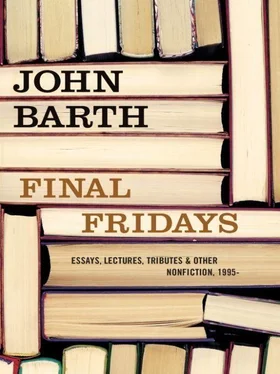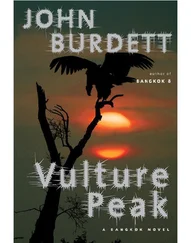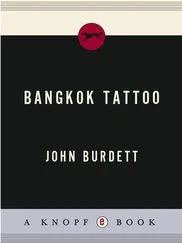Which in happier days meant reviewing and editing either the print-outs of yesterday’s first-draft pages (left off when the going was good and thus more readily resumed) or work-notes toward some project in gestation, to be followed by Step Five: re-inspiration and the composition of new sentences, paragraphs, and pages. Of late, however, Step Four has consisted of staring vainly, pen in hand, at blank ruled pages, or exchanging fountain pen for note-taking ballpoint and perusing for possible suggestions either my spiral-bound Work Notebook #5 (2008–) or my little black six-ring loose-leaf personal notebook/diary, to little avail. That latter— The Black Book of not so bright (or sunny) observations & reflections , its title page declares, on which also are the rubber-stamped addresses of its serial residences over the past forty years — has only a few blank leaves remaining, and no room for more. And the workroom’s bookshelves, reserved for one copy of each edition and translation of every book, magazine article, and anthology contribution that I’ve published, are already crowded beyond their capacity, with new editions lying horizontally across older ones and jammed into crannies between bookcase and wall.
That almost-exhausted notebook-space; those overflowing shelves — are they trying to tell me something? I plug my ears; strain not to listen. Like most fiction-writers of my acquaintance (perhaps especially those who mainly write novels rather than short stories), I’m accustomed to a well-filling interval of some weeks or even months between book-length projects: an interval not to be confused with “Writer’s Block.” Indeed, I’ve learned to look forward to that bit of a respite from sentence-making after a new book has left the shop — bulky typescript both snail-mailed and e-mailed to agent and thence to publisher — and to busily making notes toward the Next One while final-copyediting and galley-proofing its predecessor. This time, however. .
Well.
Well? A writer-friend from Kansas who knows about water-wells informs me of the important distinction between dry wells and “gurglers,” which may cease producing for a time but eventually resume; he encourages me to believe that I’m still a Gurgler. I hope that’s the case — but if in fact my well turns out to be dry, I remind myself that as we’ve aged, my wife and I have been obliged to put other much-enjoyed pleasures behind us: snow- and water-skiing, tennis, sailboat-cruising on the Chesapeake, and yes, even vigorous youthful sex (but certainly not love and intimacy, and as someone once wisely observed, “Sex goes, memory goes, but the memory of sex — that never goes”). If my vocation — my “calling”!—has joined that sigh-and-smile list of Once Upon a Times, its memory will be a fond one indeed.
Time will tell.
Meanwhile, maybe write a little piece about. . not writing?
Introduction to Not-Knowing: The Essays and Interviews of Donald Barthelme
Although it’s neither my first memorial tribute to Donald Barthelme (1931–1989) nor my last, 1what follows — written at the request of Donald’s brother Frederick (himself an accomplished novelist, editor of The Mississippi Review , and alumnus of the Hopkins Writing Seminars) to introduce a posthumously published collection of Don’s nonfiction 2—is the one I think best suited to open this “Tributes and Memoria” section of Final Fridays .
“HOW COME YOU write the way you do?” an apprentice writer in my Johns Hopkins workshop once disingenuously asked Donald Barthelme, who was visiting. Without missing a beat, Don replied, “Because Samuel Beckett was already writing the way he does.”
Asked another, smiling but serious, “How can we become better writers than we are?”
“Well,” DB advised, “for starters, read through the whole history of philosophy, from the pre-Socratics up through last semester. That might help.”
“But Coach Barth has already advised us to read all of literature , from Gilgamesh up through last semester. . ”
“That, too,” Donald affirmed, and twinkled that shrewd Amish-farmer-from-West-11th-Street twinkle of his. “You’re probably wasting time on things like eating and sleeping: Cease that, and read all of philosophy and all of literature. Also art. Plus politics and a few other things. The history of everything.”
Although I count myself among my late comrade’s most appreciative fans — invariably delighted, over the too-few decades of his career, by his short stories, his novels, his infrequent but soundly-argued essays into aesthetics, and his miscellaneous nonfiction pieces (not to mention his live conversation, as above) — I normally see The New Yorker , in which so much of his writing was first published, only in the waiting rooms of doctors and dentists. I have therefore grown used to DB-ing in happy binges once every few years, when a new collection of the wondrous stuff appears (originally from Farrar, Straus, & Giroux; anon from Putnam; later from Harper and Row; finally from Random House) and I set other reading aside to go straight through it, savoring the wit, the bite, the exactitude and flair, inspired whimsy, aw-shucks urbanity, irreal realism and real irreality, wired tersitude, and suchlike Barthelmanic pleasures.
Finally , it says up in that parenthetical list of his publishers. The adverb constricts my spirit; I feel again what I felt when word came of Donald’s illness and death in 1989, at age merely-58, in the fullness of his life and happy artistry: my maiden experience of survivor-guilt, for we were virtual coevals often assigned to the same team (or angel-choir or Hell-pit) by critics friendly and not, who require such categories — Fabulist, Postmodernist, what have they. We ourselves, and the shifting roster of our team-/choir-/pit-mates, 3were perhaps more impressed by our differences than by any similarities, but there was most certainly fellow-feeling among us — and was I to go on breathing air, enjoying health and wine and food, work and play and love and language, and Donald not? Go on spinning out my sometimes hefty fabrications (which, alphabetically cheek-by-jowl to his on bookshelves, he professed to fear might topple onto and crush their stage-right neighbor), and Donald not his sparer ones, that we both knew to be in no such danger?
Well. One adds the next sentence to its predecessors, and over the ensuing years, as bound volumes of mine have continued to forth-come together with those of his other team-/choir-/pit-mates, it has been some balm to see (impossibly posthumous!) Donald’s appearing as before, right along with them, as if by some benign necromancy: first his comic-elegaic Arthurian novel The King (1990); then The Teachings of Don B. (1992), a rich miscellany eloquently foreworded by T-/C-/P-mate Thomas Pynchon; now Not-Knowing ; and still to come, a collection of hitherto unpublished and/or uncollected short stories.
Benign it is, but no necromancy. We owe these last fruits not only to Donald’s far-ranging muse, but to the dedication of his literary executors and the editorial enterprise of Professor Kim Herzinger of the University of Southern Mississippi. Thanks to that dedication and enterprise, we shall have the print-part of our fellow whole, or all but whole. Never enough, and too soon cut off — like Carver, like Calvino, all at their peak — but what a feast it is!
ITS COURSE IN hand displays most directly the high intelligence behind the author’s audacious, irrepressible fancy. The complementary opening essays, “After Joyce” and “Not-Knowing” (that title-piece was for years required reading in the aforementioned graduate fiction-writing seminar at Johns Hopkins); the assorted reviews and pungent “comments” on literature, film, and politics; the pieces “On Art,” never far from the center of Donald’s concerns; the seven flat-out interviews (edited after the fact by the interviewee) — again and again I find myself once again nodding yes, yes to their insights, obiter dicta, and mini-manifestoes, delivered with unfailing tact and zing. See, e.g., “Not-Knowing”’s jim-dandy cadenza upon the rendering of “Melancholy Baby” on jazz “banjolele”: as astute (and hilarious) a statement as I know of about the place of “aboutness” in art. 4Bravo, maestro banjolelist: Encore!
Читать дальше












